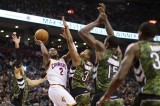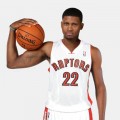
Last week Chris Bosh was in Toronto attending one of his off-season publicity obligations. When confronted by a scrum of local media reporters he made two official announcements that came to no surprise to the Raptors fan republic or the greater NBA community. First, he announced that he would not be signing a contract extension with the Raptors this summer (even though Raptors GM Bryan Colangelo had previously expressed his intention to offer him one) and that he would be exercising his contractual opt-out clause next summer to become an unrestricted free agent for the first time in his career.
“I’m thinking I just want to stick to my goal, stick to what I was doing. That’s a part of the plan. I just want to address things (after) next season. There’s a reason why I did things the way I did them back then.”
When asked whether he would consider giving the Raptors a hometown discount next summer – the Raptors ownership group is infamous for running a very frugal yet highly profitable operation – his second announcement was that he fully expects to receive a maximum-salary contract from whichever team he decides to sign with.
“Without a doubt. I really don’t see any negotiation about that part.”
These informal announcements have been heavily discussed and subjectively interpreted by fans and media alike. The most popular topic of discussion was his maximum salary expectation. The Republic masses have long debated whether Bosh is in fact worth an equal salary as his more accomplished contemporaries such as LeBron James and Dwayne Wade, both of whom are undisputedly two of the league’s rarest breed of superstar players. While Bosh isn’t viewed as an NBA superstar, he has in is own right proven himself to be a perennial all-star player by his peers, as well as by the league’s echelon of coaches and executives.
Taking a quick survey of the league’s current talent pool, the present NBA reality is that there are only, arguably, 5 superstar players and approximately 15 perennial all-star players (established and soon-to-be). Given the fact that there are 30 teams in the league, these top-20 players are all categorized as being “franchise players” since any one team would be fortunate to have one of them under contract. (Observing the Los Angeles Lakers who have two of these top-20 players, Kobe Bryant and Pau Gasol, it’s no surprise that they are making their second consecutive appearance in the NBA Finals and are two wins away from being crowned this season’s league champions). With only 20 franchise players in a 30 team league, simple economics dictates that the market value to acquire any one of these players is a maximum salary, regardless of the observed and accepted talent disparity between the league’s few all-stars and fewer superstars. Since Bosh is indeed a top-20 player it’s easy to understand why he expects to be offered a maximum-salary contact by a number of teams who’ll be capable of doing so, since nearly all of them are expected to aggressively recruit him. In short, the NBA’s free agent free-market forces dictates that perennial all-stars like Bosh be paid the same salary as superstars like James.
Knowing and accepting what Bosh’s market value realistically is, it’s interesting to review what course of action would be the most lucrative for him from a financial standpoint. Money has and always will be a key motivator for professional athletes. If money is Bosh’s primary motivation, in terms of maximizing his career earning potential, it would have been in his best financial interests to have accepted the Raptors contact extension this summer. Instead, he is risking the fate of his fortune against the odds of suffering a career-ending injury next season. Even though he has decided not to re-sign with the Raptors this summer, Bosh could still agree to re-sign with the Raptors next summer, and the team is capable of offering him a “full max contract” (valued at $133M/6 years) which would be worth more money and run an additional year longer than any other team’s max offer. However, the commonly used argument to justify leaving the Raptors for a lesser max contract is that he could make up the salary difference through his increased endorsement earning potential if he were with an American team for the remainder of his career. But this argument falls flat because Bosh’s endorsement earning potential likely wouldn’t amount to the approximately $16M difference between the Raptors full max contract and any other team’s max contract. (Let alone the $100M+ should he suffer a critical injury next season). By rejecting a guaranteed maximum-salary contract, it’s evident that money isn’t the primary motivation in Bosh’s playing career.
Perhaps the reason he’s chosen to reject a contract extension is to use the pressure of entering into a “contract year” season to work as hard as he ever has during this off-season to increase his talent potential and improve his athletic abilities in order become the very best player he can possibly be.
“I want to be like … LeBron. He’s fast. He’s quick and he’s one of the biggest guys on the court. I look at him and I’m, like, `Man, that’s what I want.'”
His desire to prove to the league and to himself that he is a “cusp superstar” and is legitimately worth another max-contract (instead of just being considered an all-star player who’ll get paid a max-contract only because the league’s free agent market will dictate it) is highly commendable and exhibits the leadership qualities expected from a franchise player. By making every effort to be the very best player he can be, it shows that he has the same mental motivation and willful determination as all the best and greatest professional athletes, past and present.
In addition to reaching his self-assessed player-potential and getting paid his full market value, another key motivational factor Bosh has that’s ingrained in every professional athlete is the goal of winning a championship. A divisive quote Bosh also made last week actually revealed the true perspective regarding his decision not to sign Toronto’s extension offer.
“An old school guy told me: ‘Take advantage. You can’t play this game forever. Make sure you maximize your potential.'”
By only skimming the surface of this quote’s meaning, the popular opinion expressed by both fans and media regarded it as an indicator that Bosh’s primary motivation is solely financial. However, it is my opinion that the true significance of this quote is much deeper and that its true meaning actually yields a clear revelation that Bosh’s definitive motivation is to win a championship. I formed my opinion by breaking the quote down for analysis. First, the principal meaning of “maximize your potential” isn’t just about money; if it were Bosh would have accepted the Raptors extension offer in order to guarantee his career earning potential, which he didn’t. Therefore this quote must have meant that he was advised to “maximize your [talent] potential” in terms of using your talent to achieve the highest level of success that reflects your talent. Now, when re-reading the first portion of the quote “Take advantage. You can’t play this game forever“, the essential meaning behind it was that as a professional athlete you might only have one chance in your career to win a title. That’s a powerful and lasting statement given the fact that he aspires to be remembered as one of the great players of his generation. Finally, who do you think was the “old school guy” who gave Bosh this advice? Elgin Baylor? George Gervin? Charles Barkley? Dominic Wilkins? Patrick Ewing? Karl Malone? It could literally be any number of people. But personally, I’m guessing it was Raptors Assistant Coach, Alex English.
What is enlightening about the possibility that Bosh was given this quote by any one of the above mentioned players is the fact that all of them, including English, are Hall-of-Fame players who never won an NBA championship title. That’s a shame because every hall-of fame player that never got to win a championship title never achieved the highest level of success that reflected their talent and their dedication to their craft. There are countless numbers of such players in every sports hall-of-fame. Ask anyone of these players if they would have changed anything about their careers and they would certainly all say the same thing: That they wish they had won a league championship and experienced the ecstasy of celebrating the sweetest of all victories with their teammates, their family, the organization and all of the fans along the parade route through their team’s city.
Having completely analyzed and re-assessed Bosh’s series of quotes last week in reference to his announcements, we now have a better understanding of Chris Bosh and his motivations as a player. In actuality, Bosh simply reiterated last week what he has consistently said over-and-over again since last summer: He will do everything he feels he must to reach his full potential as a player and wants to give himself the best chance of winning a championship during his career by becoming an unrestricted free agent at the very peak of his career. The only opportunity a player ever gets to choose a team to play for is when he becomes an unrestricted free agent. Of course in Bosh’s case, the team he’ll choose to play for will have to have both the cap space to sign him to a max-contract and a legitimate chance to win a title with his addition.
There should be absolutely no doubt that Chris Bosh’s principal motivation is to become the best player he can be, to win an NBA championship and to get paid the princely sum he’s worth. Even though these motivations aren’t at all unique, what differentiates Bosh from many other NBA players is the strength of his character and the level of his intelligence.
Because Chris Bosh has treated the Raptors organization and the city of Toronto with nothing but the up-most class and respect since the day he was drafted, I sincerely hope he achieves his dream of winning a least one NBA Championship in his career, whether it be as a member of the Toronto Raptors or not.





